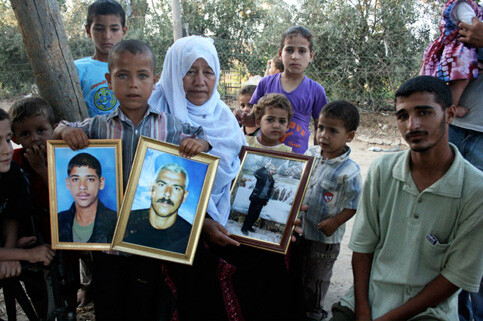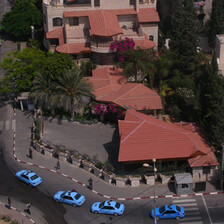Gaza Strip 16 July 2008

The Salach family (Philip Rizk)
At the end of my visit they started asking me to take pictures for their brothers, uncles, sons and fathers detained in Israeli prisons for over four months — a picture of a newborn not yet seen by the imprisoned father, one father’s favorite girl and a picture of the detainees’ pictures hanging on the wall to let the prisoners know they are missed, they are celebrated.
On 19 March Israel rounded up Assad Salach and his sons Fahmi and Salach and Assad’s brother Sa’id and his son Ghassan along with over 300 men age 16 and above along its northern border with the Gaza Strip. It is not the first time that Israel arrests the male members of the Salach family.
These days when homemade Qassam rockets are launched from the Gaza Strip they are usually launched from within the cities, not these border areas. Thus, it makes little sense for these men to be arrested solely for security purposes. Rather, it seems to be a method of pushing the families inhabiting the border areas into the cities and deserting their only source of income, their land. Israel is successfully destroying the potential of the fruit basket of the densely populated Strip. The once luscious green land is now reduced to an arid no-man’s-land, easily monitored by Israel’s security towers and drones overlooking it all. But more importantly the economic crisis caused by this ongoing intentional de-development of Gaza’s economy is destroying the society’s makeup.
The Salach’s main family home was destroyed in 2001. On 25 March eight Israeli bulldozers crossed the nearby border and flattened the fields. Shortly thereafter they came back and flattened the home with some family members still inside. That day Abu Assad, the Salach family grandfather, had a stroke, he and his wife, Um Assad were taken to the hospital. By the end of the day Um Assad had lost her husband, her home and the trees that had adorned the family’s fields. She moved a half kilometer down the road to her other son’s home. Today, Israel has taken him as well.
Assad and Sa’id used to collect the tank shells, things of ugliness, which Israel fired on them as they tended to their goats and fields. They would paint them and fill them with flowers and turned them into vases, things of beauty. “The day they started doing that the Israelis almost completely stopped firing at us,” Assad’s wife told me. As soon as the media spread pictures of their act — turning death into life, ugliness into beauty — the shells stopped falling. When the men were detained so were the vases; Israel did not want such a story to continue getting out.
Despite a ceasefire, five of the Salach family members remain imprisoned without even a court case; their fields still lie in ruin as the Israeli army fires at them when they try and approach it; their old home remains demolished while the memories of the past continue to haunt them daily. But today, the ceasefire allows them to host a guest.
Philip Rizk is Egyptian-German and lived in Gaza from 2005 to August 2007. Philip currently resides in Cairo and writes for Daily News Egypt and runs a blog: tabulagaza.com. He can be emailed at philiprizk A T yahoo D O T com.




